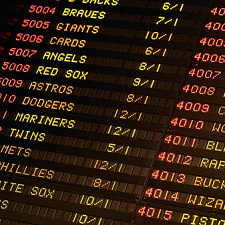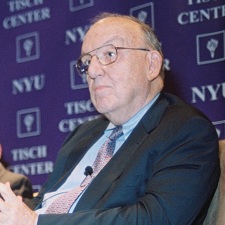IS LORIA’S PRICE RIGHT?
Sunday, June 25th, 2017“Nobody pays attention” was Fay Vincent’s comment that prompted me to write this column.
The former baseball commissioner was talking about the baseball writers whom I characterize as having trouble or no interest covering anything that doesn’t take place on the field. He was talking about them because he had received a call a day earlier from a Florida writer who called him with questions about Jeffrey Loria’s attempt to sell the Miami Marlins.
Despite interest from two groups who have been publicly identified and others who Commissioner Rob Manfred has said are interested, Loria has been unsuccessful in finding a buyer at his price and reportedly has been forced to lower his price from $1.6 billion to $1.3 billion and may have to lower it still more.
One of the questions the reporter asked Vincent was about Loria’s seemingly eye-popping billion-plus asking price. The Los Angeles Dodgers sold for $2 billion several years ago, but the Marlins are not in the Dodgers’ talent or economic class.
Vincent said he asked the reporter if he had followed talk about the possibility that Congress will adopt a law permitting betting on professional sports.
“You’re telling me something that hasn’t come up,” Vincent said the reporter replied. “No one has said anything about that. Loria hasn’t said anything.”
Vincent, however, has said plenty. He has been taking about the issue for months, if not years, and he was quoted about it extensively in a column that appeared in this space last Feb. 12.
He might have started talking about it after Adam Silver, commissioner of the National Basketball Association, wrote an op-ed piece that appeared in The New York Times in November 2014. In his column Silver advocated legalized betting on sports events. He also noted that the NBA supported a sports betting bill in 1992.
His reasoning: “…despite legal restrictions, sports betting is widespread. It is a thriving underground business that operates free from regulation or oversight. Because there are few legal options available, those who wish to bet resort to illicit bookmaking operations and shady offshore websites.”
In addition, though Silver didn’t mention it, legal betting would not only benefit states financially but it would also produce revenue for the teams, which naturally are the attraction for bettors.
Rob Manfred certainly had that benefit in mind last February when he addressed a business conference and revealed a position on legalized gambling no previous baseball commissioner ever uttered. Manfred said he was monitoring the issue and “re-thinking” MLB’s position opposing betting on baseball.
 “There is this buzz out there in terms of people feeling that there may be an opportunity here for additional legalized sports betting,” the commissioner told his audience. Betting on games, he added, “can be a form of fan engagement. It can fuel the popularity of a sport.”
“There is this buzz out there in terms of people feeling that there may be an opportunity here for additional legalized sports betting,” the commissioner told his audience. Betting on games, he added, “can be a form of fan engagement. It can fuel the popularity of a sport.”
Is Manfred so concerned about the future of baseball and fans’ interest in it that he is ready to sell out to the gamblers and entice them with the prospect of betting on games?
“Sports betting happens,” he told the conference attendees. “Whether it’s legalized here or not, it’s happening out there. So I think the question for sports is really, ‘Are we better off in a world where we have a nice, strong, uniform federal regulation of gambling that protects the integrity of sports, provides sports with the tools to ensure that there is integrity in the competition, or are we better off closing our eyes to that and letting it go on as illegal gambling? And that’s a debatable point.”
Two months after expressing his new views on sports gambling, Manfred added to his changed outlook.
Talking with a group of reporters in April, Manfred said MLB would be open to consider Las Vegas as a home city if a major league team wanted to relocate. The Oakland Athletics and the Tampa Bay Rays play in undesirable parks and have had trouble securing public funds for new parks.
“If we were looking at relocation, Las Vegas would be on the list,” Manfred said, departing from baseball’s long-held position on the country’s gambling mecca.
The city’s position, however, has changed dramatically. The NFL’s Oakland Raiders are scheduled to move to Las Vegas in 2020, and the city has gained a National Hockey expansion franchise for 2018.
Meanwhile, the Marlins are up for sale for $1.3 billion. Do you sense a connection? I mean, the Marlins, under existing practice, are not a $1.3 billion franchise.
For one example, they have probably the worst television deal among the 30 teams. They are said to receive $20 million a year from Fox Sports Florida. Jeffrey Loria, the Marlins’ owner, made that deal several years ago because he was desperate to get cash to pay off debts. He has said privately that he can’t get out of the deal so he’s stuck with it while other teams are getting many millions more.
Loria still has a lot of debt, and a $1.3 billion sale price would take care of it nicely. But why would anyone want to pay that much for a team that has been so poorly run? That’s what Vincent explained to the Miami Herald reporter early last week, but as of Saturday’s Herald, the explanation had not appeared.
Vincent believes baseball will join the NBA in lobbying Congress to adopt a law that will permit betting on sports events. He thinks it could happen as soon as the next two or three years.
“You have to start with the proposition that the American public is totally convulsed by gambling,” he said in a telephone interview Saturday. “The gambling business is large across the country, extraordinarily large. It ranges from the state-run Lotto’s to DraftKings.”
DraftKings is a major source of fantasy sports betting, having merged with its biggest competitor, FanDuel. They have benefited from a major, if questionable, ruling by Congress that declared fantasy sports to be games of skill and not gambling.
Given that thinking, the leagues may actually have a chance to get what they want from Congress. But back to Vincent’s explanation:
“I read in a reputable newspaper that the amount of money bet world-wide annually is $400 billion. If you say the U.S. share is 10 percent, you’re talking about $40 billion being bet on sports in the United States and I’m assuming a large amount of that is bet on professional sports, and a very large percentage of that is the NFL, which we know is a monster gambling operation because it has the injuries in the paper every week so gamblers can figure out what the spread should be and what the odds should be.
“I couple that with the NBA’s open affirmation of an effort to legalize betting and Silver saying our owners want to share in the revenue that’s produced by betting because we’re the ones generating the revenue and illegal people are benefiting enormously and we think that should be our business.
“It comes down to when will this change take place or will it take place. I say it’s inevitable because there’s so much money involved Congress will say let’s tax it and get some of that 40 billion dollars. With the NBA and others pushing for it, it seems to me the issue isn’t whether but when.
“That’s why the value of franchises has to be on the uptick. I don’t think anyone buying a franchise today wouldn’t say that’s a relevant consideration. When’s that going to happen or is it going to happen? If in two or three years, which is my guess, or sooner, that would be a bonanza. If in 10 years, that would be less of a bonanza but still an enormous plus. But the present value is reduced substantially.
“This is speculation on my part, but you can imagine Congress saying we’re going to legitimize sports betting but we’re going to regulate it. We don’t want it to get out of control. We’ll decide how the sports books would be legalized. Congress would say we’re going to tax the revenue, let’s say 50 percent of the sports revenue.”
The remainder would go to the leagues, which divide it among themselves and their teams. If the tax were less than 50 percent, the more there would be for the leagues and their teams.
And a new Marlins’ owner could tolerate the dumb deal Loria made with Fox if he were receiving a large bundle of cash annually as the Marlins’ share of the gambling take. And who knows? If baseball betting comes, can slot machines in the ballpark be far behind?
Manfred, too, has heard the clink of coins. Money has a way of changing a lot of minds, including commissioners’ minds and politicians’ minds.
“How can politicians do that in good conscience?” Vincent asked. “Politicians see that people are going to play slot machines and gamble. They say ‘Why don’t we make it legal and benefit from it?’”

 What greater coincidence could occur than the one that has occurred with the re-emergence of Pete Rose and John Dowd to public attention?
What greater coincidence could occur than the one that has occurred with the re-emergence of Pete Rose and John Dowd to public attention?

 In fact, the only organization asked or required to take a stand is the Baseball Writers Association of America, whose qualified members vote on candidates for the Hall of Fame.
In fact, the only organization asked or required to take a stand is the Baseball Writers Association of America, whose qualified members vote on candidates for the Hall of Fame.